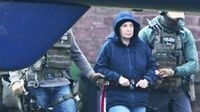The trial of former RAF terrorist Daniela Klette has commenced at the Higher Regional Court in Celle, Germany, under heavy security. Klette, now 66 years old, faces serious charges including attempted murder, illegal possession of weapons, and aggravated robbery. Her case draws public interest not only due to her radical past with the left-wing extremist Red Army Faction (RAF) but also because she spent 35 years in hiding before her arrest in February 2024.
The proceedings began on March 25, 2025, with strict security measures in place. The use of a secure courtroom has been deemed necessary given Klette's notorious background. Law enforcement officials have highlighted their concerns about the safety of those involved in the case and the historical significance of the charges against her.
Klette’s history is marked by significant criminal activity, with prosecutors alleging that she participated in at least 13 robberies between 1999 and 2016. These offenses primarily targeted money transporters and supermarkets across Northern Germany, specifically in Lower Saxony, North Rhine-Westphalia, and Schleswig-Holstein. This extensive criminal spree is estimated to have netted over 2.7 million euros.
During the trial, it emerged that Klette is accused of more than monetary gain from these crimes; her alleged actions involved violence. For instance, in June 2015, during a robbery in Stuhr, a masked individual reportedly fired a rapid-fire weapon at a money transport vehicle, an act that the prosecution is treating as attempted murder since it involved a clear threat to life.
Focusing on the circumstances of Klette's lifestyle leading up to her arrest, investigators revealed that she had been living under multiple false identities. For over three decades, Klette evaded capture while leading what appeared to be a normal life in Berlin, where she worked as a private tutor, enjoyed local community activities, and engaged with neighbors who described her simply as a friendly woman named 'Claudia'. They were largely unaware of her treacherous past and ongoing criminal enterprises.
The revelation of her former life has drawn attention from both media and law enforcement. Following her arrest in February 2024, police executed a thorough search of her apartment in the Kreuzberg district of Berlin, uncovering an arsenal of weapons. Among the findings were a Kalashnikov, a hand grenade replica, and a significant amount of cash, totaling over 240,000 euros. Additionally, investigators found extensive documentation and materials suggesting elaborate planning went into the robberies, as well as DNA evidence linking her to the crime scenes.
As the trial progresses, the prosecution will focus on establishing the connections between Klette, her accomplices—Ernst-Volker Staub and Burkhard Garweg, who remain fugitives—and the robberies they executed. The bloodshed associated with these events heightens the stakes for Klette, both in terms of public perception and legal consequences.
Klette's defense team, however, has argued against the clarity of the evidence presented by the prosecution. Undine Weyers, one of Klette's lawyers, stated before the trial, "Yes, it is likely that Ms. Klette had something to do with the robberies," but emphasized that there was no definitive proof of her presence at the crime scenes or of her direct involvement. She insists that the forensic evidence is not straightforward and could be misinterpreted.
The trial is expected to be ongoing for several months, potentially extending until the end of the year as the defense and prosecution lay out their cases. Observers anticipate that further allegations may arise concerning Klette’s past, including her suspected involvement in violent actions during the 1990s, specifically attacks linked to the RAF's legacy such as the 1991 US Embassy bombing in Bonn and other terrorist activities.
In historical context, the RAF was an active militant group from the 1970s until the late 1990s, responsible for numerous violent acts aimed at altering the political landscape in Germany. With Klette’s connection to the so-called third generation of the RAF, this trial not only deals with individual actions but also examines a larger narrative about terrorism and its enduring impact on society.
As authorities and legal analysts keep their eyes on the trial unfolding in Celle, the implications of Klette's actions and her eventual sentence could reverberate across discussions of justice and retribution for decades past crimes, along with questions about how history continues to shape present realities.
The ongoing proceedings promise to shed light on Klette’s involvement in a series of extensively planned crimes while posing broader inquiries into society’s response to past transgressions and the quest for justice against those who once instigated fear and violence.









